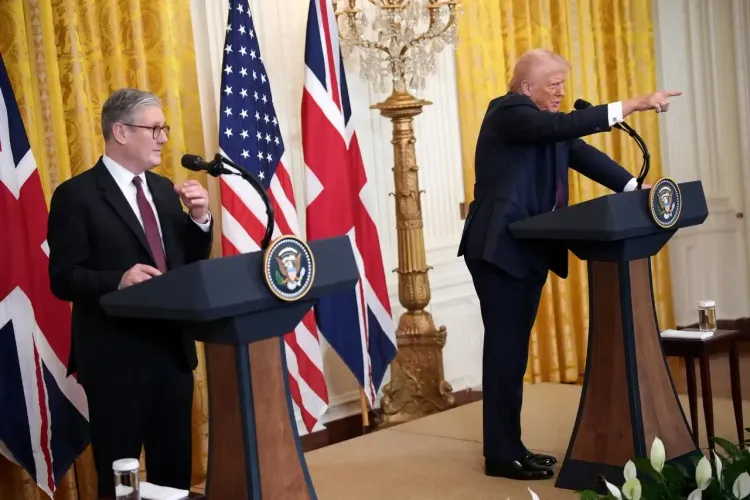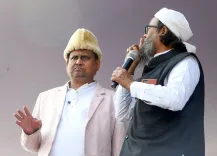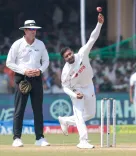Trump Affirms Support for NATO's Mutual Defence Pact

Synopsis
Key Takeaways
- Trump supports NATO's Article V mutual defence clause.
- Concerns arise from his past comments on NATO spending.
- Ukraine continues to face challenges against Russia.
- NATO members aim to meet defence spending targets.
- Trump's statements have implications for US foreign policy.
Washington, Feb 28 (NationPress) US President Donald Trump has expressed support for NATO's Article V clause, which mandates that alliance members defend one another.
Trump's remarks, delivered during a joint press conference with British Prime Minister Keir Starmer, come as both leaders participate in critical discussions regarding Europe's future peace. This follows Trump's history of questioning the resilience of longstanding treaties and alliances.
Article V stipulates that NATO members must assist each other in the event of an attack.
When queried about this clause in relation to potential European peacekeepers in Ukraine as part of a peacekeeping mission post-ceasefire, Trump stated, “I support it.”
“I believe we will not require it, as I foresee a successful and enduring peace, hopefully achieved swiftly,” he added.
However, he cautioned, “If it doesn’t happen quickly, it may not happen at all.”
Trump's past remarks regarding the mutual defence obligation have raised concerns among some of the US's closest allies.
Last year, Trump suggested he would permit Russia to act freely towards NATO members failing to meet their defence spending commitments.
“You didn’t pay? You’re delinquent?” Trump recounted saying. “No, I would not protect you. In fact, I would encourage them to do whatever they want. You must fulfill your obligations.”
In 2014, NATO allies committed to reverse defence spending cuts made post-Cold War, aiming to allocate two percent of their GDPs on defence by 2024, following Russia's annexation of Ukraine's Crimean Peninsula.
White House spokesperson Andrew Bates responded, stating, “Encouraging invasions of our closest allies by murderous regimes is appalling and unhinged – it jeopardizes American national security, global stability, and our domestic economy.”
Trump's comments arise as Ukraine continues to struggle against Russia's 2022 invasion and as Congressional Republicans grow increasingly doubtful about providing further financial support to the nation amidst stalled counteroffensives and weapon shortages.
During his 2016 campaign, Trump unsettled Western allies with threats to abandon NATO treaty commitments, pledging to defend only those countries that adhere to the alliance's requirements of contributing two percent of their GDPs to military spending.
As President, Trump ultimately supported NATO's Article 5 mutual defence clause, which asserts that an armed attack on one member is considered an attack on all. However, he regularly portrayed NATO allies as dependents on the US military and questioned the value of the military alliance that has shaped American foreign policy for decades.
As of 2022, NATO indicated that only seven out of the current 31 member countries were fulfilling this obligation, an increase from three in 2014. Russia's 2022 invasion of Ukraine has prompted certain NATO members to boost military expenditure.










